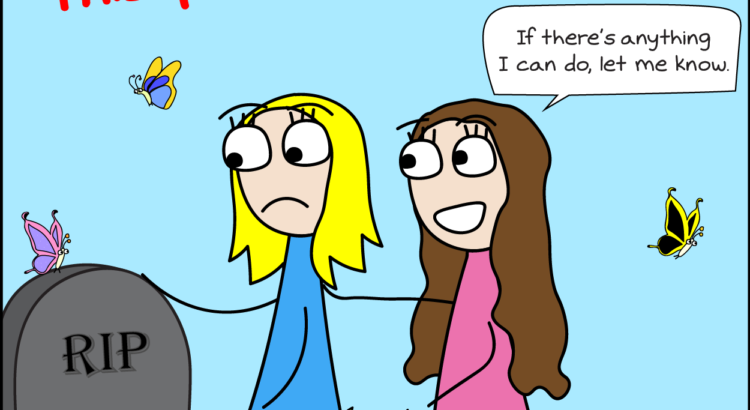Author: Sarah

Why “If there’s anything I can do, let me know” is the most unhelpful phrase ever
When my sister Melissa died, people tried to be helpful. But humans suck at consoling each other.
Ok.
Our Father, who art in heaven, couldn’t you have let Melissa live just a little longer?
Sure, but what if the reason is that we’re in Final Destination and you’re next?
It’s difficult to offer meaningful condolences. Unfortunately, I’ve probably also been a poopyhead.
I didn’t nail it.
Much like She’s-With-God Girl or Everything-Happens-For-A-Reason Guy, I probably went about my day like an OG.
Meanwhile, this was likely still happening:
There are a lot of truly terrible condolence phrases.
The phrase I heard most after Melissa died was “If there’s anything I can do, let me know.” The words often came through social media, making them extra unhelpful.
I accidentally started hating the person saying the words instead of hating the words.
There’s no good response.
People also said the words to me in real life.
Sometimes it felt like people asked about Melissa’s death to confirm gossip, then steamrolled right over how I felt about it. The “let me know” part ended the conversation—the same conversation the person had just initiated. Didn’t the person know they were doing something when they acknowledged my sister?
The words made me feel foolish. I felt like a fish who’d been hooked. I took the bait. I opened up about Melissa. Then the fisherman was like: “Nevermind—catch and release!” This is what I heard:
On some level, it felt like the person might have known I would never ask for anything. This made their words feel totally meaningless. It felt like the person said the words so they could feel good about themselves without actually having to do anything.
The words also felt like this:
I started thinking of weird responses to keep myself entertained.
Lots and lots of mint chocolate chip ice cream.
I also like Pumpkin Spice Lattes (not from Olive Garden).
I want to be Scrooge McDuck.
Asking for what you need is challenging in any emotional state. It can feel impossible in grief.
Directness would be ideal and I’m sure Sharon would have obliged. But I wasn’t going to ask for what I needed. Despite my elaborate daydreams, I didn’t know what that was.
So if this phrase is garbage, what does help?
A few days after Melissa died, my family went out to eat at our favorite Mexican restaurant. Life felt fake and fractured. I ate a lot of cheese. During the meal, a waitress approached our table.
The waitress told my family that a couple at a nearby table paid for our meal. The couple left the restaurant before we could thank them.
Eleven years later, I remember exactly how their gesture made me feel. I realized other people knew about the feelings of pain. Other people cared enough to try and make it better. Their kindness connected me back to the world. It shocked me out of the feelings of anger and loneliness that I was harboring in my head.
On the one-year anniversary of Melissa’s death, my best friends sent me a package. It contained obscene amounts of my favorite treats.
There were like 30 Kinder-cake bars inside the package. And enough Snickers and Coca-Colas to give me diabetes. My friends’ thoughtfulness was like receiving a giant hug. I think I laugh-cried.
Years after Melissa died, I saw a friend from high school. I had not seen him or spoken to him since her death. About eight minutes into our conversation, he said something that sticks with me.
We talked about Melissa only briefly. But in those simple words, he acknowledged an event that had been a really big deal to me. It took bravery for him to bring up a subject that could be uncomfortable, and to do so directly.
These actions of strangers and friends shared common themes. They displayed empathy, showed interest, and acknowledged feelings. They put effort into their words and actions. These people took charge without putting any onus on me.
Their actions also educated me. Because of their compassion, I learned how to suck a little less at condolences.
The Snibbles Snowball: why I lied about my dead sister’s cat
I lied to a lot of hairdressers after my sister died.
I never meant to lie. Melissa’s death was sudden and awkwardly made me the oldest child. In the weeks and months (and even years) after she died, I would panic during small talk.
The words came out before I could stop them. My sister used to live in Kalispell.
The words hung in the air.
Maybe not.
I don’t know the polite answer. Imagine if I told the truth.
Imagine if I tried to over-explain.
Alienating.
A few years later, I moved to Washington, D.C. for a job. Meeting new people gave me lots of opportunities to improve my answers.
I still panicked.
Sometimes people asked questions about my siblings, which meant discussing Melissa. How did I deal? By playing dodgeball.
I wasn’t good at dodgeball.
Before she died, Melissa adopted a cat named Snibbles. Melissa made a Facebook page for Snibbles, like all responsible pet owners.
Rolland was my first new friend in D.C. and he noticed I was friends with Snibbles on Facebook.
My parents adopted Snibbles when Melissa died.
Rolland didn’t know I had a sister who died. He didn’t know Snibbles was Melissa’s cat and nobody had access to her Facebook page.
Probably because I lied about it.
I ignored the situation until my birthday. My birthday was two weeks after I moved to D.C.
Rolland was my first new friend.
Should I risk alienating him?
Admitting a lie about my dead sister’s cat seemed like I might return to zero friends.
I tried guessing the password. It couldn’t be that hard.
It was that hard.
Besides being my first new friend, Rolland was also my colleague. He sat next to me in the office every day. It felt really important to know the password because Snibbles was making me look like a dick.
I tried playing dodgeball.
To my delight, Rolland played along.
It felt nice to blame Snibbles.
At some point in our friendship, Rolland learned about my sister and the plane crash that killed her. I did not tell him Snibbles was her cat.
I told Rolland the truth about Snibbles four years later over text message when we no longer lived in the same place or worked together.
It’s probably too late to come clean to the hairdresser.


